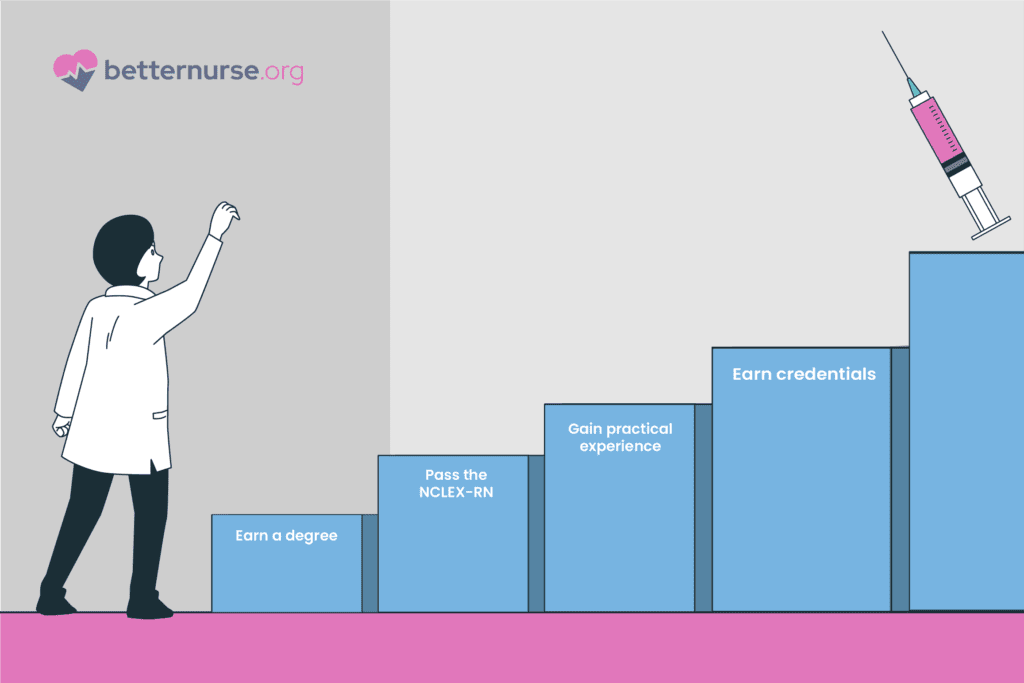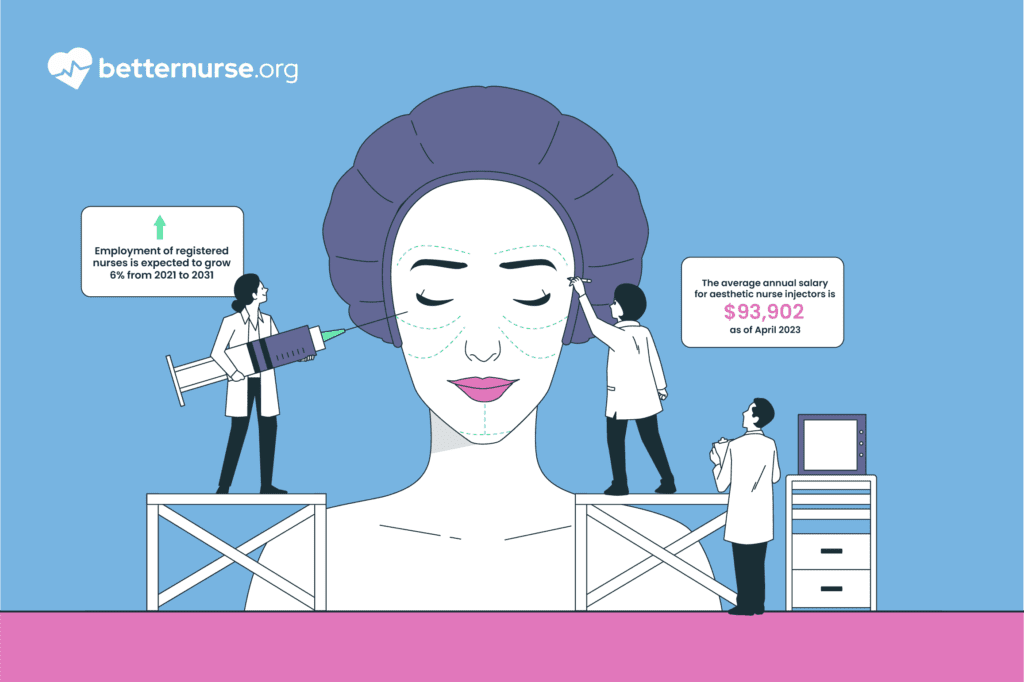Becoming a nurse injector can provide a fulfilling career helping clients achieve their aesthetic goals while utilizing your nursing skills and expertise.
If you’re interested in the field of injectable treatments, you might want to know more about nurse injectors. These professionals are highly sought after, especially in medical spas, dermatology clinics, and plastic surgery offices. In this blog post, you’ll learn about what nurse injectors do, the qualifications and training they need, their career prospects and potential salary, and any restrictions that might apply to this profession. Whether you’re a nursing student or a healthcare professional looking to broaden your expertise, this guide will give you valuable insights into the world of nurse injection.
Takeway
Becoming a nurse injector is like building a house—it requires a strong foundation of education and training to support a rewarding career with many opportunities for growth and success.
What Is a Nurse Injector?
Nurse injectors are essential in boosting patients’ confidence and comfort in their skin. They are healthcare professionals who specialize in administering injectable treatments like Botox, dermal fillers, and sclerotherapy. They work closely with licensed physicians, evaluating patients, suggesting treatments, and administering injections. Nurse injectors can be found in different healthcare settings, such as medical spas, dermatology clinics, and plastic surgery offices.
What Does a Nurse Injector Do?
A nurse injector’s primary responsibility is administering cosmetic treatments through injectables such as Botox and dermal fillers. To ensure the safety and effectiveness of these procedures, they first consult with patients to discuss their desired results and evaluate their medical history to determine if they are a suitable candidate.
Nurse injectors must have a comprehensive understanding of facial anatomy and injection techniques and use this knowledge to administer the treatments. These nurses need to have excellent communication skills to educate patients on the procedure, aftercare, and any potential side effects. Keeping detailed medical records and following strict protocols and regulations is also a vital part of the job of a nurse injector. Additionally, they may be responsible for marketing and promoting their services and maintaining their equipment and supplies.
How To Become a Nurse Injector: Step by Step

If you aspire to become a nurse injector, you need to follow a few steps to accomplish your objective. Here is a quick summary of the process:
Earn a degree
Earning a degree is one of the first steps in becoming a nurse injector. A Bachelor of Science in Nursing (BSN) degree is typically required to become a registered nurse (RN), a prerequisite for becoming a nurse injector. In addition to providing a foundation in nursing theory and practice, earning a BSN degree also ensures that aspiring nurse injectors have a thorough understanding of anatomy, physiology, and pharmacology. This knowledge is essential for administering injectable treatments safely and effectively.
Pass the NCLEX-RN
Passing the National Council Licensure Examination for Registered Nurses (NCLEX-RN) is another crucial step in becoming a nurse injector. The NCLEX-RN assesses a person’s proficiency and expertise in nursing, guaranteeing they possess the essential abilities to deliver secure and efficient healthcare to patients. Aspiring nurses must pass the NCLEX-RN exam to obtain a nursing license, allowing them to practice as registered nurses. Those interested in a career as nurse injectors must become registered nurses before pursuing additional training and certifications in injectable treatments. Passing the NCLEX-RN is essential in becoming a nurse injector, as it establishes the foundation for a successful nursing career.
Gain practical experience
Gaining practical experience is another necessary step in becoming a nurse injector. Aspiring nurse injectors must first gain experience working as registered nurses in a clinical setting. This allows them to develop their nursing skills and knowledge, gain experience working with patients, and become familiar with the healthcare system. Additionally, practical experience in a clinical setting allows aspiring nurse injectors to observe and learn from experienced healthcare professionals, including nurse injectors. This experience is invaluable in developing the skills and knowledge necessary to become a successful nurse injector.
Earn credentials
To become a nurse injector, one must earn the necessary credentials. While a nursing license is required to practice as a registered nurse, additional training and certifications are essential to become a nurse injector. Several organizations offer certification programs in injectable treatments, such as the Plastic Surgical Nursing Certification Board and the American Society of Plastic Surgeons (ASPS). These programs provide in-depth training on injectable treatments, including the proper administration of Botox and dermal fillers, anatomy and physiology, and patient assessment and management. Earning credentials from these organizations is essential for establishing credibility as a nurse injector and ensuring that patients receive safe and effective treatments.
What Are Some Nurse Injector Practice Restrictions?
While nurse injectors play an essential role in administering injectable treatments, there are some restrictions on what they can do. Nurse injectors must work under the supervision of a licensed physician and follow strict guidelines to ensure patient safety. They cannot diagnose medical conditions or prescribe medications; they must refer patients to a physician if they have any concerns about their health. Additionally, nurse injectors must limit their practice to the specific treatments they are trained and certified to administer. It is essential to understand these practice restrictions before pursuing a career as a nurse injector.
Nurse Injector Career Prospects and Salary

Nurse injectors are in high demand, and the job outlook for this profession is positive. According to the Bureau of Labor Statistics, employment of registered nurses is expected to grow 6 percent from 2021 to 2031. This growth is due to an aging population, an increased emphasis on preventive care, and a growing demand for healthcare services.
Overall, the career prospects for nurse injectors are promising, with a growing demand for their services and competitive salaries. According to ZipRecruiter, the average annual salary for aesthetic nurse injectors is $93,902 as of April 2023. This salary can vary depending on location, experience, and specialty.
Conclusion
Becoming a nurse injector can be a rewarding career choice for those interested in healthcare and aesthetics. However, it requires dedication, education, and training to become qualified and thrive in this field. Becoming a nurse injector includes the following:
- Earning a nursing degree.
- Passing the NCLEX-RN exam.
- Gaining practical experience.
- Earning credentials in injectable treatments.
Aspiring nurse injectors can build a fulfilling career in aesthetics and healthcare with the proper education, training, and credentials. Additionally, nurse injectors must be aware of their state or country’s practice restrictions and regulations. Despite the challenges, nurse injectors have a promising career outlook and can expect to earn a competitive salary.
Frequently Asked Questions (FAQ)
What is the difference between an injector nurse and an aesthetic nurse?
Both injector nurses and aesthetic nurses are integral to the field of aesthetic medicine. An aesthetic nurse typically has a broader scope of responsibilities related to various non-surgical aesthetic procedures. In contrast, an injector nurse specializes in administering injectable treatments, such as Botox and dermal fillers. These nurses’ roles may overlap to some extent, and they often work together to provide comprehensive and personalized aesthetic care to patients.
Do nurse injectors make more money than aesthetic nurses?
According to ZipRecruiter, aesthetic nurse injectors can earn up to $137,500 annually, with the average salary being $75,776 per year. On the other hand, the average aesthetic nurse practitioner salary in the U.S. is $94,732, with great potential to reach $218,000 annually.

Nurse Luke is a CRNA who specializes in Nursing content and still enjoys a very busy career with Locum, Per Diem and Travel nursing in the greater midwest. He has over 25 years of experience in the healthcare field and received his CRNA masters degree from the Mayo Clinic School of Healthcare. He is passionate about helping nurses explore the options of becoming a travel nurse as well as spending time with his Family.



